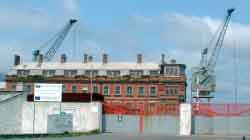As an island economy, a healthy maritime sector is key to our national competitiveness. Virtually all our imports and exports pass through Irish ports.
Ireland is dependent on ports and shipping services to transport goods and 90% of our trade is moved though Irish ports. Shipping and maritime transport services make a significant contribution to Ireland’s ocean economy, with the sector generating €2.3 billion in turnover and employing over 5,000 people in 2018.
Ireland’s maritime industry continues to grow and progress each year with Irish ports and shipping companies making significant investments. The ports sector in Ireland is currently undergoing a number of expansions and developments with Dublin Port’s Alexandra Basin development, the development of Ringaskiddy in Cork by Port of Cork and the development of Shannon Foynes Port. Along with these major investments, shipping companies are also investing heavily in new tonnage, with Irish Ferries, CLdN and Stena leading new build programmes.
These pages cover the following sectoral areas: shipowners, harbour authorities, shipbrokers, freight forwarders and contractors, cruise liner operators, port users, seamen, merchants, academic institutions, shipyards and repair facilities, naval architects, navy and defence personnel.
Our pages are covering some of the most notable arrivals around our coast and reporting too on port development and shipping news.
This section of the site deals with Port and Shipping News on our largest ports Dublin Port, Port of Cork, the Shannon Estuary, Galway Harbour and Belfast Lough.
A recent study carried out for the Irish Ports Association (IPA) totalled 75.7 billion during 2004 and their net economic impact was some 5.5 billion supporting around 57, 500 full time employees.
Liam Lacey, Director of the Marine Institute’s Irish Maritime Development Office (IMDO) said, “The Irish maritime industry can look to the future with confidence. It has shown itself to be resilient and agile in responding to challenges. Over the past decade, it has had to respond to the challenges of the financial crisis of 2008, the uncertainty surrounding Brexit and recent challenges. Ireland’s maritime sector has continued to underpin our economy by maintaining vital shipping links for both trade and tourism.”
 Greenore is a small town and deep water port on Carlingford Lough in Co. Louth, Ireland. The population of Greenore and the surrounding rural area (electoral area) was 898 in the 2002 Irish census.
Greenore is a small town and deep water port on Carlingford Lough in Co. Louth, Ireland. The population of Greenore and the surrounding rural area (electoral area) was 898 in the 2002 Irish census.






























































